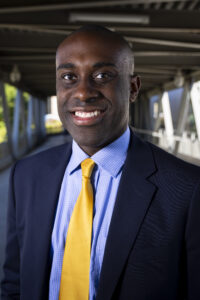Mark Attiah, MD has joined the University of North Carolina at Chapel Hill in the Department of Neurosurgery as an Assistant Professor of Neurosurgery and Director of Peripheral Nerve Surgery.
Dr. Attiah’s surgical training is in the treatment of spine and peripheral nerve disorders. His residency and fellowships included specialized training in treating spine conditions such as herniated discs, trauma, fractures, and tumors, along with minimally invasive approaches. Dr. Attiah is also one of the few neurosurgeons in the country who specializes in the treatment of peripheral nerve disorders, including nerve compression that leads to chronic pain and weakness, and nerve reconstruction for improving limb function. He will join UNC Neurosurgery’s spine team, working alongside Dr. Cheerag Upadhyaya and Dr. Michael Galgano.
treating spine conditions such as herniated discs, trauma, fractures, and tumors, along with minimally invasive approaches. Dr. Attiah is also one of the few neurosurgeons in the country who specializes in the treatment of peripheral nerve disorders, including nerve compression that leads to chronic pain and weakness, and nerve reconstruction for improving limb function. He will join UNC Neurosurgery’s spine team, working alongside Dr. Cheerag Upadhyaya and Dr. Michael Galgano.
Peripheral nerve surgery includes the treatment of carpal tunnel syndrome, cubital tunnel syndrome, peripheral nerve tumors, brachial plexus injury, and avulsion.
Dr. Attiah did not plan on attending medical school initially, and wanted to pursue anything but science and math. After contemplating other careers and consulting with family, Dr. Attiah decided to pursue a Bachelor’s in Neuroscience. “I was always interested in the brain,” said Dr. Attiah. “It’s the reason why we are the way we are. I thought the brain was the most interesting organ that we have.”
Dr. Attiah eventually decided to pursue a career in medicine. Early in medical school, Dr. Attiah discovered that he would rather fix diseases than manage them. His interest in the brain and central nervous system combined with his interest in using his hands made neurosurgery the perfect fit.
During his first year of medical school, Dr. Attiah observed a patient with Parkinson’s disease with a deep brain stimulator. Dr. Attiah watched as the neurosurgeon turned off the deep brain stimulator and noticed the immediate return of a significant tremor. When the surgeon turned the deep brain stimulator back on, the tremor immediately went away. “I turned to my classmate sitting next to me and said ‘That is biblical. That’s what I want to do,’” said Dr. Attiah.
Many neurosurgeons told Dr. Attiah that if he could see himself doing anything other than neurosurgery, that he should pursue a different specialty. Dr. Attiah looked at other specialties, but ultimately never found a field that interested him more than neurosurgery. “What I like most about neurosurgery is that I can improve patient’s lives,” said Dr. Attiah. “It might sound strange, but I didn’t get into this field to save lives. I enjoy the privilege of being able to do that, but I want to help people’s quality of life.” Treating spine and peripheral nerve disorders offered Dr. Attiah the opportunity to do just that. “Peripheral nerve helps improve the quality of life for people,” said Dr. Attiah. “The debilitating pain is gone. That’s very powerful and what drew me to the field.”
While not many physicians enter neurosurgery training with the intention of specializing in peripheral nerve disorders, during training, Dr. Attiah found great satisfaction in helping patients that are suffering from loss of function or pain. “People don’t go into neurosurgery saying they want to operate on someone’s wrist or legs,” says Dr. Attiah. “I wanted to get as much exposure to it as possible.” Dr. Attiah completed an enfolded complex spine fellowship at Kaiser Permanente. During that time, he cross-trained with a plastic surgeon specializing in hand surgeries. He then completed a unique combined minimally invasive/complex spine and peripheral nerve surgery fellowship at the University of Miami.
One of the more complex surgeries that Dr. Attiah performs is nerve reconstruction and nerve transfers. He explained that many patients and even physicians don’t know that this is an option, and physicians often do not know where to refer patients with these types of injuries. He hopes to change this by growing the peripheral nerve program at UNC Health and by developing relationships with other physicians in the region.
Dr. Attiah sums up his research interests as “getting better at what we do.” He finds that researching ways to improve existing treatments and decision-making is what excites him most, going so far as to obtaining a Master’s degree in Clinical Effectiveness at Harvard, with a focus on decision analysis. “I wasn’t interested in finding a cure or discovering a new drug,” said Dr. Attiah. “I want to find a systematic way of getting better at getting better.”
In the past, Dr. Attiah has been involved in Artificial Intelligence and machine learning research. “With new innovations in AI and machine learning, we can try to figure out how to make a good decision for a particular patient and to personalize their treatment based on who they are and what is wrong for this patient,” said Dr. Attiah. He also hopes to collaborate with other medical centers to find a better way to treat patients with peripheral nerve disorders. Dr. Attiah hopes that advances in research will allow physicians to first discuss patient goals, and then present surgical scenarios to each patient based on what they hope to achieve through surgery.
Dr. Attiah looks forward to growing the peripheral nerve program at UNC Health, connecting with physicians in the region, and helping to restore quality of life for the patients suffering with peripheral nerve disorders in North Carolina and throughout the southeast region.
Written by: Makenzie Hardy, Marketing Coordinator, UNC Health Department of Neurosurgery